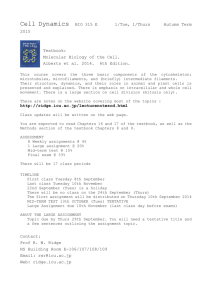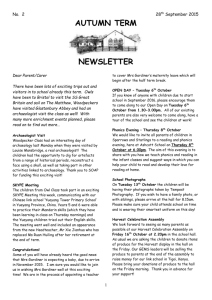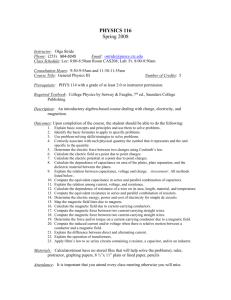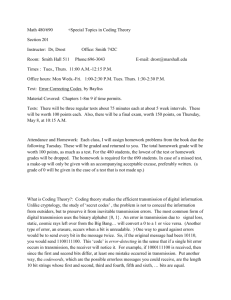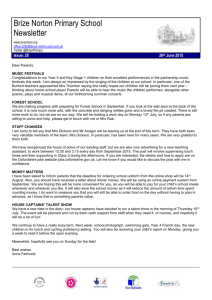Racial Passing in American Literature - Faculty
advertisement
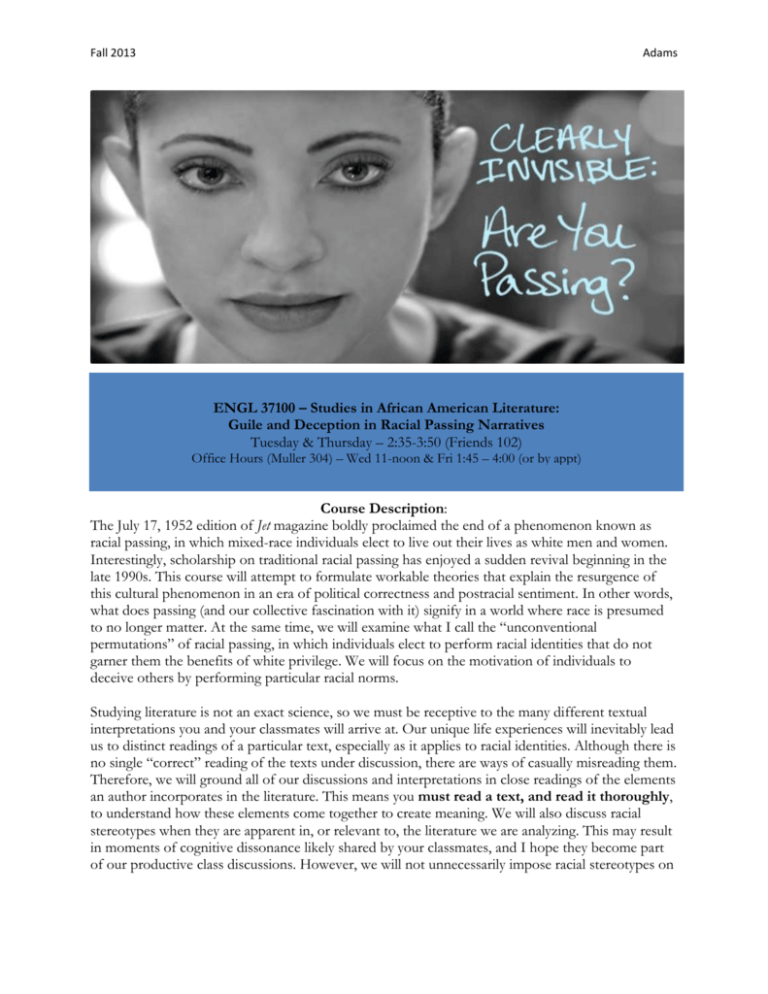
Fall 2013 Adams ENGL 37100 – Studies in African American Literature: Guile and Deception in Racial Passing Narratives Tuesday & Thursday – 2:35-3:50 (Friends 102) Office Hours (Muller 304) – Wed 11-noon & Fri 1:45 – 4:00 (or by appt) Office Hours: Mon/Tues 11:00-12:00, or by appointment Course Description: The July 17, 1952 edition of Jet magazine boldly proclaimed the end of a phenomenon known as racial passing, in which mixed-race individuals elect to live out their lives as white men and women. Interestingly, scholarship on traditional racial passing has enjoyed a sudden revival beginning in the late 1990s. This course will attempt to formulate workable theories that explain the resurgence of this cultural phenomenon in an era of political correctness and postracial sentiment. In other words, what does passing (and our collective fascination with it) signify in a world where race is presumed to no longer matter. At the same time, we will examine what I call the “unconventional permutations” of racial passing, in which individuals elect to perform racial identities that do not garner them the benefits of white privilege. We will focus on the motivation of individuals to deceive others by performing particular racial norms. Studying literature is not an exact science, so we must be receptive to the many different textual interpretations you and your classmates will arrive at. Our unique life experiences will inevitably lead us to distinct readings of a particular text, especially as it applies to racial identities. Although there is no single “correct” reading of the texts under discussion, there are ways of casually misreading them. Therefore, we will ground all of our discussions and interpretations in close readings of the elements an author incorporates in the literature. This means you must read a text, and read it thoroughly, to understand how these elements come together to create meaning. We will also discuss racial stereotypes when they are apparent in, or relevant to, the literature we are analyzing. This may result in moments of cognitive dissonance likely shared by your classmates, and I hope they become part of our productive class discussions. However, we will not unnecessarily impose racial stereotypes on Fall 2013 Adams a work or its author. Last, you must give the literature a chance. I do not expect you to share my enthusiasm for these texts, but you mustn’t be dismissive of them without having read them. Required Texts: **Dawkins, Marcia Alesan. Clearly Invisible. Everett, Percival. Erasure. Griffin, John Howard. Black Like Me. Larsen, Nella. Quicksand and Passing. Melville, Herman. Benito Cereno. Ovington, Mary White. The Shadow. Schuyler, George. Black No More. Twain, Mark. Puddn’head Wilson. Other Required Materials: - You are expected to have a printed (not electronic) copy of all reading assignments in class on the day that we are examining them. Fall 2013 Adams Course Assignments and Grading: Midterm essay (5-7 pages) Final essay (8-12 pages) Group presentations Reading Journal Attendance/Participation [25%] [40%] [20%] [10%] [5%] Standard Percentage Equivalencies for the course: 100 – 90% = A, 89 – 80% = B, 79 – 70 = C, 69 – 60 = D, 60> = E A final grade of Incomplete (I) can be awarded only in very special circumstances that you have discussed with the instructor ahead of time. Midterm essay: This 5-7 page assignment will lead you to delve more deeply into the issues that a specific text focuses on. You will look at the way an author responds to the racial dynamics of passing and all of the interrelated questions that arise in our class discussions. You will assess how the literary devices (theme, style, narrative point-of-view, form/structure, etc) an author employs work together to make meaning within a text. What you write for this assignment can (and should) serve as groundwork for your final essay. Final essay: This assignment will be an extension of an argument you make in your midterm. This 8-12 page essay will focus primarily on close readings of one of the primary texts. You will use at least three secondary sources to complete your analysis, keeping in mind that I am still primarily interested in your interpretations of a text. Do not let the voices of critics and scholars trump your own. Group presentations: There are two parts to this assignment. First, you will be partnered with one of your classmates and charged with putting together an in-class presentation. This 15-20 minute oral presentation will elaborate on an author’s larger body of work. It will provide the class with a greater context for understanding the text we are examining and will serve as an introduction to our in-class discussion. Feel free to use things like notes, outlines, and handouts, but do NOT simply read from a piece of paper or from PowerPoint slides. All group members must contribute equally to (and during) the presentation. A sign-up sheet will be circulated at the beginning of the second week of class. Second, you will write a synopsis (roughly 1000 words) of the process behind your presentation. Consider including where you came across your sources, why you chose the sources you did, how the class responded to your presentation, how that measured against your expectations, what it was like working with your partner, why you divided the presentation in the manner you chose, etc. I am mostly interested in your reflections on how you think the presentation went from inception through the end. Reading Journal: You will maintain a reading journal over the course of the semester. The intent is for you to informally reflect on the initial ideas and emotions you experience as you engage the literature. I am also interested in the connections you make between the experiences of characters and your own personal life. I expect your reflections to be well written, but your grade for the assignment will depend on how thoughtful and honest they are. There will be at least one entry for each new text we read. Fall 2013 Adams Attendance/Participation: Your presence in the class is only a part of your participation in this course. In my experience, the most interesting classes are the ones in which students contribute more to class discussions than the instructor. Honestly, nobody wants to listen to me ramble on and on. Therefore, you need to come to class having closely read the assigned material and prepared to discuss your analyses. Treat every class as though you will have to speak on a particular subject and/or text for a few minutes. Course Policies: Students with Documented Disabilities In compliance with Section 504 of the Rehabilitation Act of 1973 and the Americans with Disabilities Act, reasonable accommodation will be provided to students with documented disabilities on a case by case basis. Students must register with the Office of Student Disability Services and provide appropriate documentation to the college before any academic adjustment will be provided. Attendance Your presence is required at every one of our scheduled class meetings. You are also expected to arrive on time. Arriving 10 minutes late for class will count as half an absence. Anything more the 10 minutes counts as a full absence. Both will result in a reduction in your overall grade. I am well aware of the unpredictable madness of everyday life taking place beyond the boundaries of Ithaca College. Therefore, you will be granted 3 excused absences over the course of the semester. Just be certain to inform me of your absence as early as possible. On your sixth absence from class (essentially three full weeks of class time), you will be administratively dropped from the course. Classroom Conduct This one is simple – use your manners. Be respectful of others. Absolutely no talking on the phone or texting! No Facebook. No MySpace. No YouFace. Be attentive. No food or drink. Plagiarism The theft of the intellectual property of another individual or entity, whether it be purposeful or unintentional, is a serious offense that carries with it severe consequences. The offender will immediately fail the assignment with no chance for resubmission and will have to meet with me outside of class to discuss the infraction. The circumstances behind the plagiarism may warrant even further action as outlined in the Student Handbook. Refer to the Student Conduct Code (http://www.ithaca.edu/policies/vol7/volume_7-70102/), the “Plagiarism” library tutorial, or visit me during office hours if you have further questions. Course Schedule: WEEK ONE (8/29) Thurs Classroom introductions / Syllabus Review WEEK TWO (9/3, 9/5) Tues Passing Thurs Passing Fall 2013 WEEK THREE (9/10, 9/12) Tues Quicksand Thurs Quicksand WEEK FOUR (9/17, 9/19) Tues Puddn’head Wilson Thurs Puddn’head Wilson WEEK FIVE (9/24, 9/26) Tues Black No More Thurs Black No More WEEK SIX (10/1, 10/3) Tues Black No More Thurs In-class writing workshop **Midterm rough draft due at the beginning of class WEEK SEVEN (10/8, 10/10) Tues Benito Cereno Thurs Benito Cereno WEEK EIGHT (10/15) Tues Benito Cereno WEEK NINE (10/22, 10/24) Tues Black Like Me Thurs Black Like Me **Midterm final draft due at the beginning of class WEEK TEN (10/29, 10/31) Tues The Shadow Thurs The Shadow WEEK ELEVEN (11/5, 11/7) Tues The Shadow Thurs The Jerk WEEK TWELVE (11/12, 11/14) Tues Soul Man Thurs Tropic Thunder WEEK THIRTEEN (11/19, 11/21) Tues Drinking Coffee Elsewhere Thurs Recitatif Thanksgiving Break: November 23 – December 1 Adams Fall 2013 WEEK FOURTEEN (12/3, 12/5) Tues Erasure Thurs Erasure WEEK FIFTEEN (12/10, 12/12) Tues Erasure Thurs Wrap Up / Teaching Evaluations Final Exam - TBD Adams


